It seems we can’t find what you’re looking for. Perhaps searching can help.
Sign Up for newsletter!
Subscribe to get the latest eBook!
Hotline






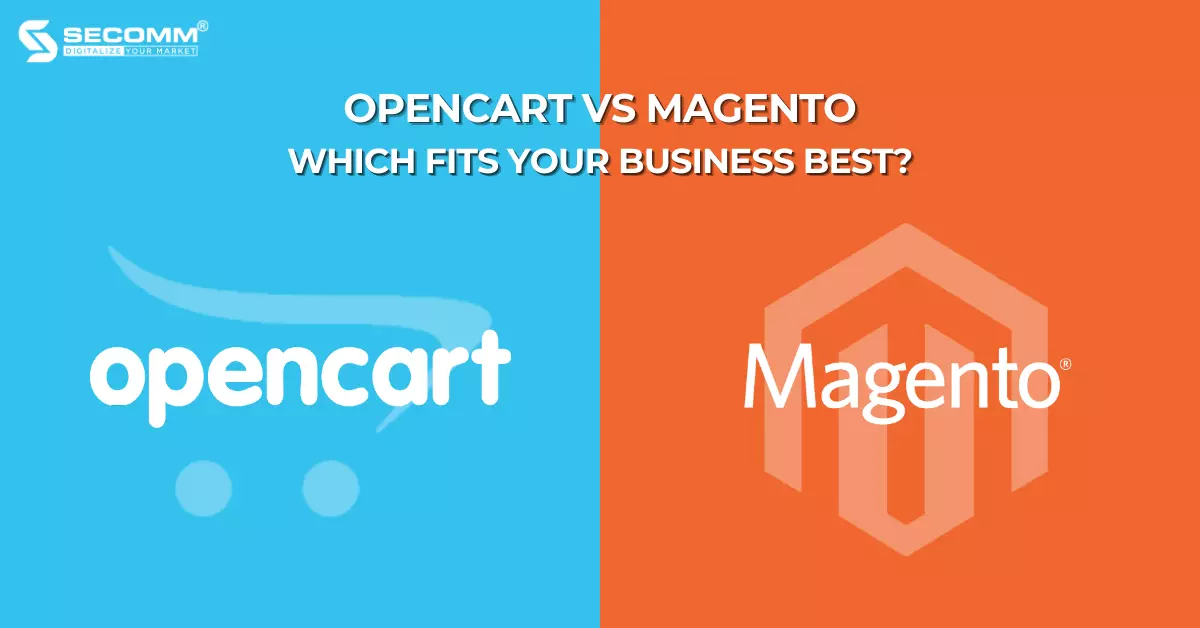
OpenCart and Magento have consistently been pitted against each other as open-source platforms for businesses in need of building specialized eCommerce websites, particularly for enterprises and corporations.
So, which of these open-source eCommerce platforms, OpenCart or Magento, is the right fit for your business?
OpenCart is a freely developed open-source eCommerce platform designed in PHP. It’s favored for its user-friendliness and simplicity, boasting an easy-to-navigate admin dashboard that allows product management, promotions, order processing, and reporting without requiring technical expertise.
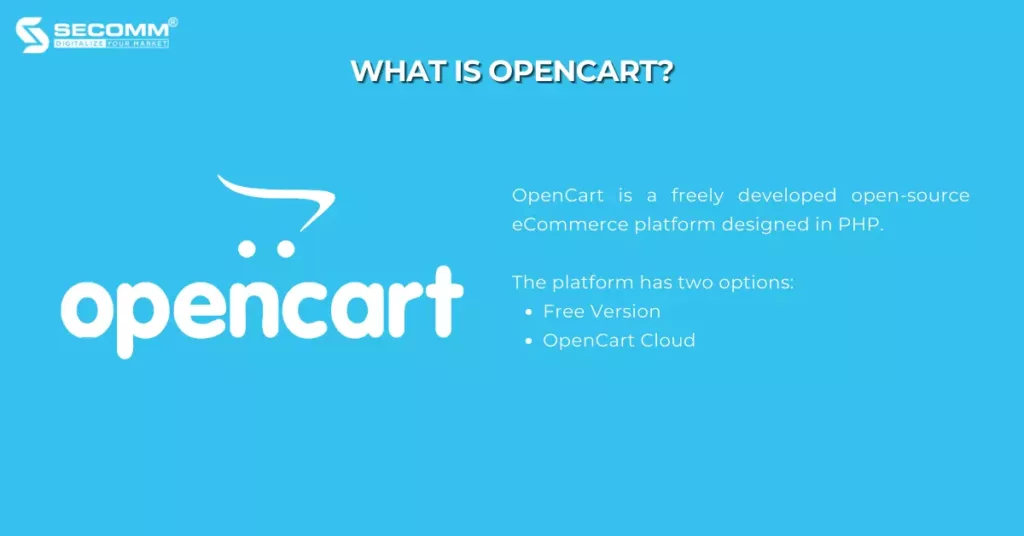
OpenCart offers two options for businesses:
As per Build With data, OpenCart has been adopted by over 400,000 websites, primarily by small to medium-sized businesses in the United States, Russia, the United Kingdom, Ukraine, and Brazil.
Related Reading: What is OpenCart? Key Pros and Cons of OpenCart
Magento (Adobe Commerce), much like OpenCart, is an open-source eCommerce platform developed using the PHP programming language. Magento stands as the ‘pinnacle’ among all open-source eCommerce platforms due to its comprehensive control and high scalability, offering a plethora of specialized features.
At present, Magento provides three primary editions, which are:
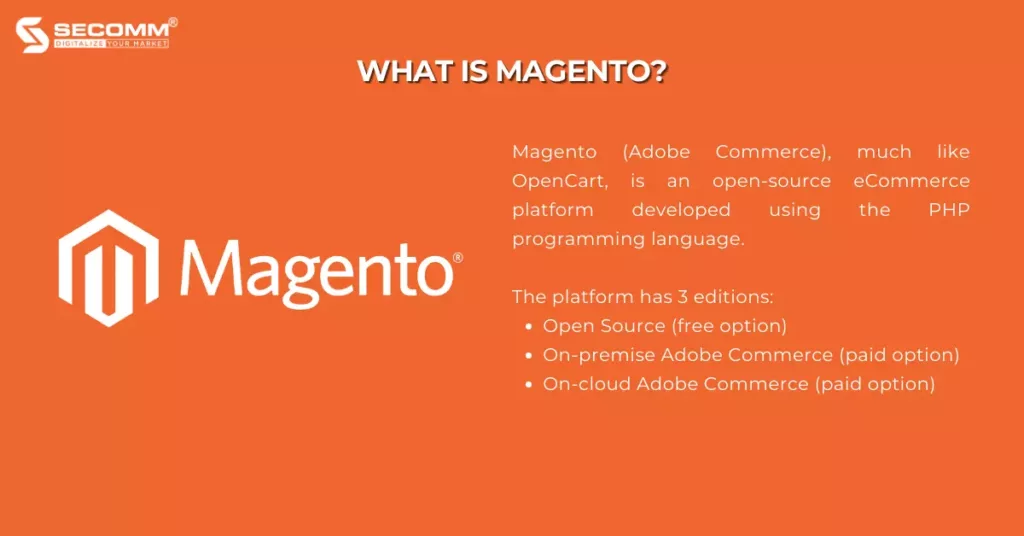
According to BuildWith, Magento supports over 160,000 websites, with significant popularity among large businesses in the United States, the United Kingdom, the Netherlands, and Germany.
Given the differences in service offerings between the paid versions of OpenCart and Magento, this SECOMM article will focus on comparing the two free versions.
Related Reading: What is Magento? Key Pros and Cons of Magento
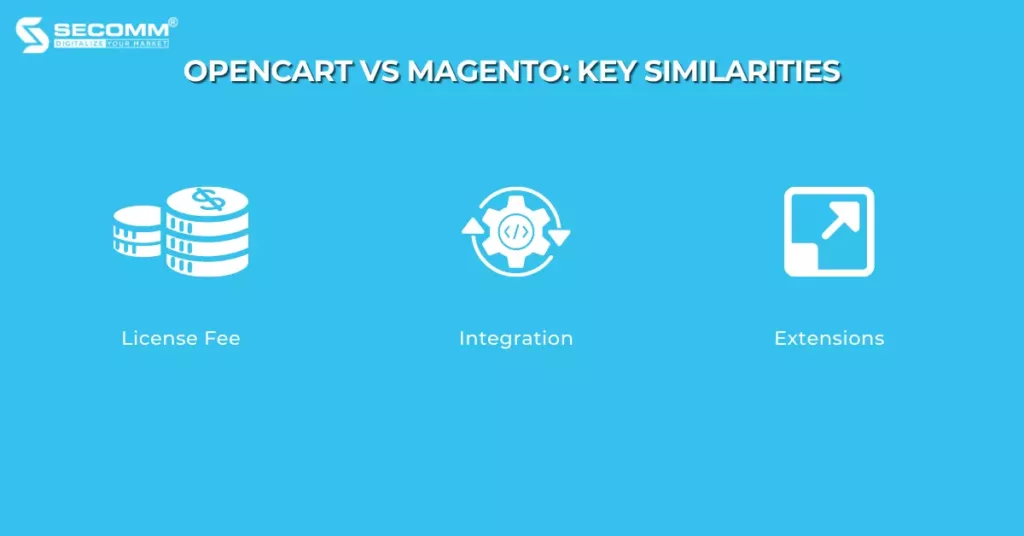
Overall, OpenCart and Magento are both open-source platforms developed using PHP. They are both robust eCommerce platforms with powerful features and a multitude of additional utilities.
The usage costs of OpenCart and Magento are quite alike, as both offer free enterprise versions that can be downloaded and installed without any charges.
Since they are open-source platforms, both possess exceptional customization capabilities for integrating third-party add-ons.
This enables businesses to effortlessly install and manage various management systems like POS, ERP, CRM, and others within a single system.
OpenCart offers an extensive library of extensions, with approximately 13,000 extensions at your disposal. Likewise, Magento boasts a vast collection of extensions, with over 5,000 to choose from.
Both platforms enable businesses to enhance their eCommerce websites with a plethora of additional features using these extensions, eliminating the need for coding concerns.
OpenCart is recognized as being more user-friendly for beginners, primarily due to its intuitive interface and straightforward installation process. However, businesses should still possess a basic level of technical knowledge related to hosting, FTP (File Transfer Protocol), security upgrades, and the like.
Within the admin dashboard, users can effortlessly navigate through sections such as ‘Catalog,’ “Extensions”, “Sales”, “System”, “Reports”, and “Help”.
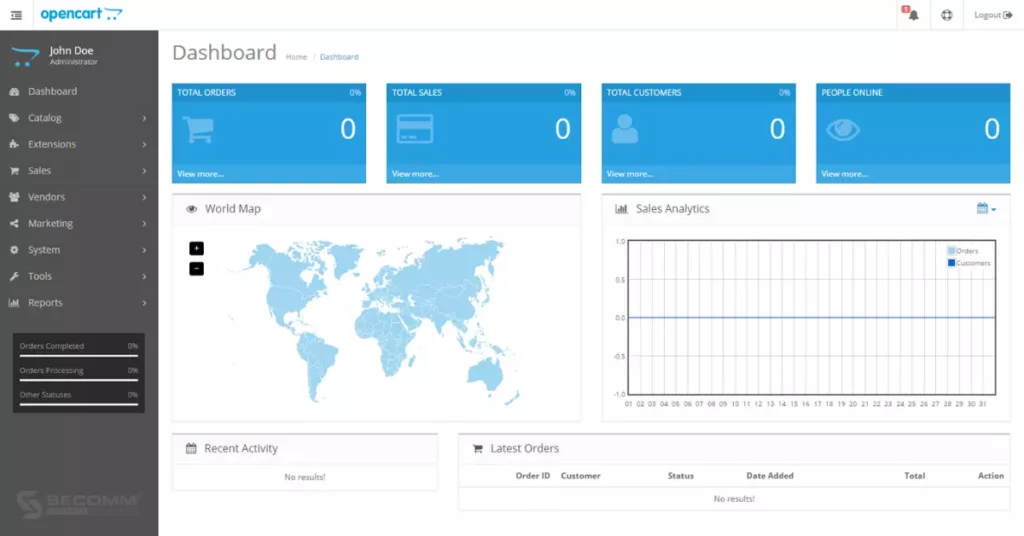
Magento isn’t a “playground” suited for beginners due to its intricate installation process, which demands a high level of technical expertise to set up.
While Magento 2 is considered more user-friendly than Magento 1, the admin dashboard still offers a multitude of options that can pose challenges for newcomers, especially when it comes to understanding Magento-specific terminology, resulting in a time-consuming learning curve.
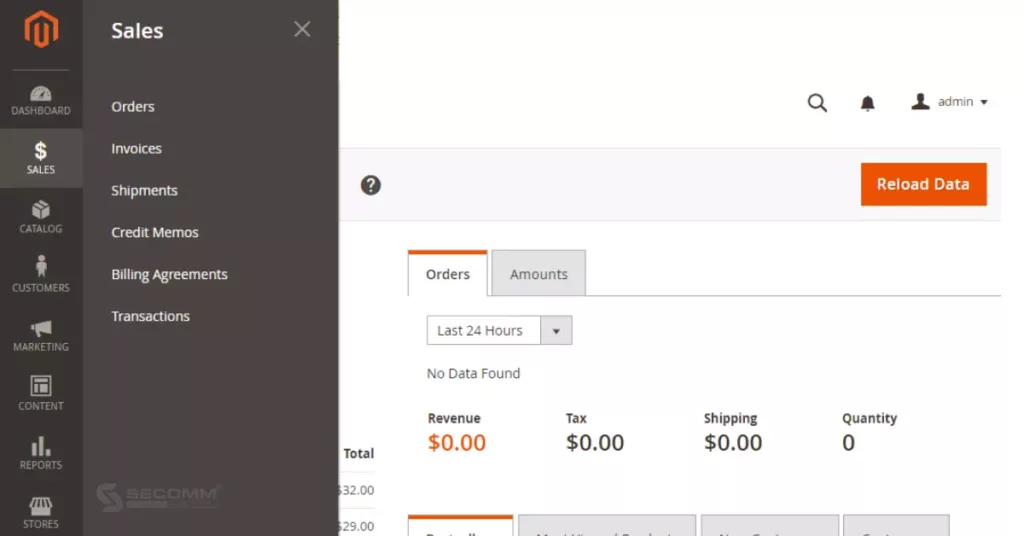
OpenCart provides around 500 themes, available in both free and paid options (ranging from $60 to $70), catering to diverse industries. This platform enables businesses to preview their website’s appearance with various themes before making a purchase. Subsequently, businesses can customize these themes according to their specific needs.
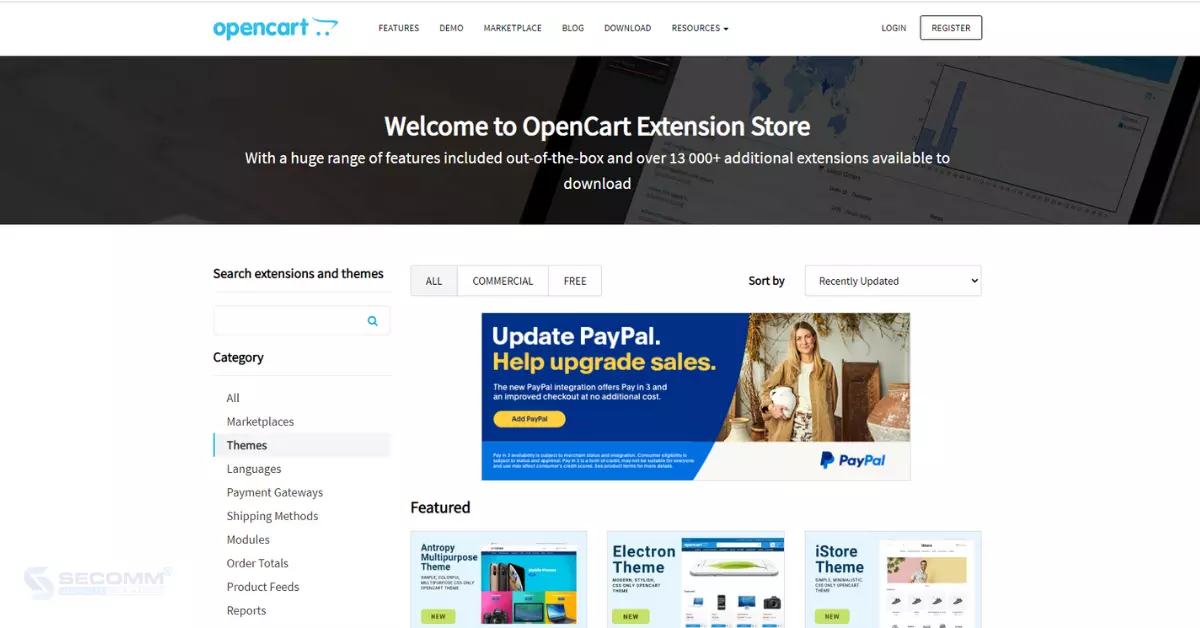
In the case of Magento, businesses have three options for creating user interfaces:
In summary, both OpenCart and Magento offer a wide selection of budget-friendly themes, but Magento allows for more extensive customization to optimize the eCommerce website’s interface.
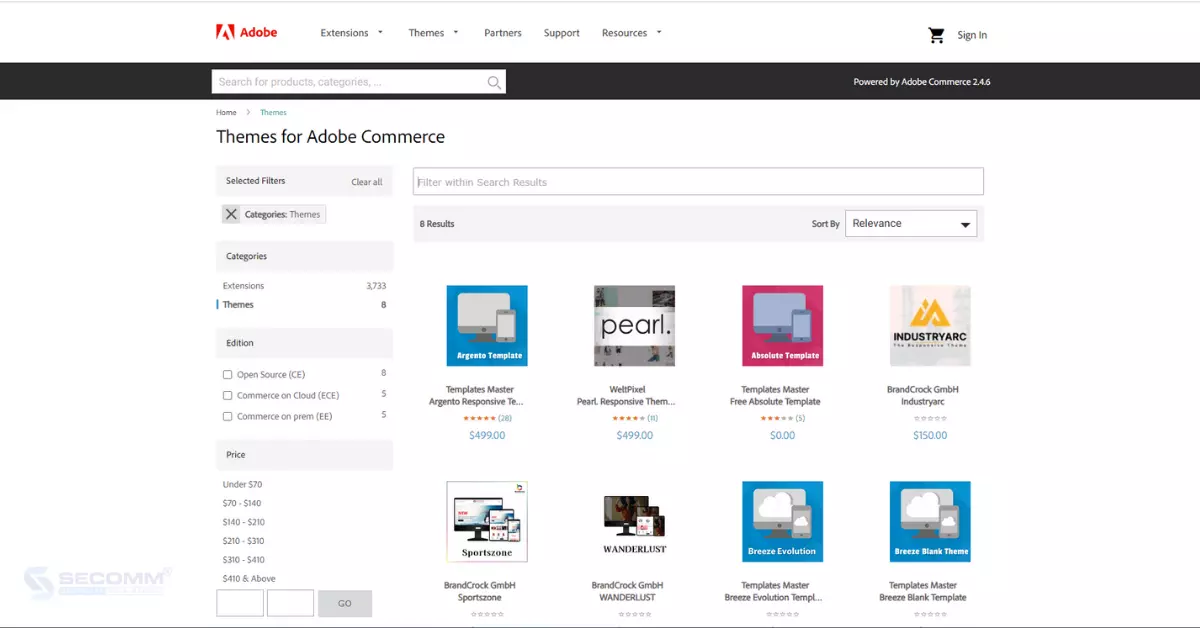
In terms of scalability, OpenCart is suitable for small and medium-sized business websites because it can only handle a limited number of products and transactions. On the other hand, Magento is specifically designed to manage large and complex eCommerce websites, capable of handling thousands of products and daily transactions without performance issues.
When it comes to flexibility, OpenCart provides a variety of extensions and add-ons to enhance website functionality. However, its flexibility may be somewhat constrained when dealing with intricate custom requirements. In contrast, Magento offers a higher degree of flexibility, enabling businesses to customize every aspect of their website. It boasts a comprehensive system of modules and better compatibility with third-party integrations, allowing businesses to tailor and expand their website to suit their specific needs.
Overall, Magento surpasses OpenCart in terms of scalability for eCommerce websites.
OpenCart offers two types of support to its users:
Magento provides a Help Center, but its support staff primarily focuses on Adobe Commerce, which may not fully address the needs of businesses using Open Source. However, Magento boasts a global developer community of over 13,000 individuals, making it relatively straightforward to find solutions.
OpenCart doesn’t assume responsibility for the security of eCommerce websites as it operates on an open-source platform. This means that OpenCart’s code and framework are publicly available, rendering websites more susceptible to potential attacks.
In contrast, despite also being an open-source platform, Magento places a strong emphasis on security. Magento has consistently released security patches since 2015 to identify vulnerabilities. This commitment ensures that eCommerce websites built on Magento maintain a high level of security, instilling confidence in online shoppers.
Through the use of third-party tools such as Mage Report and Mage Scan, businesses can assess their security status. Additionally, Magento employs CSP (Content Security Policy), which offers a structured set of principles for restricting browser content to trusted services only. This allows browsers to determine which web tools to block and which ones to trust.
Even though both OpenCart and Magento are provided with free licenses, there is a significant difference in the development costs for eCommerce websites.
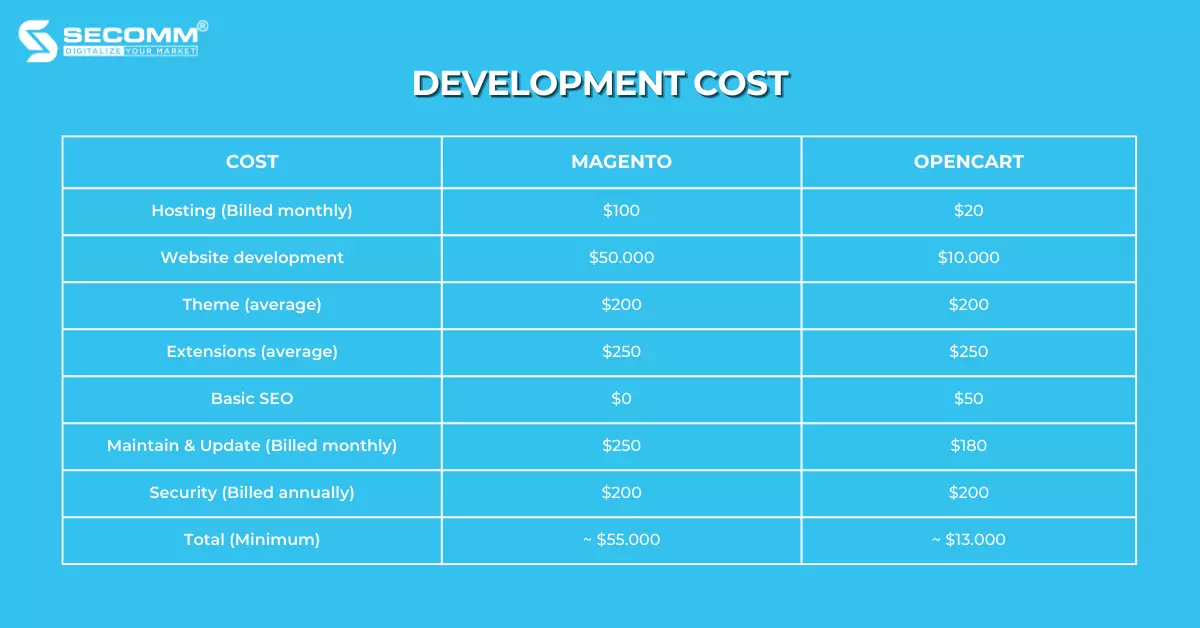
While Magento comes with a higher implementation cost than OpenCart, it offers a plethora of features for eCommerce websites. These include advanced search capabilities with Elasticsearch and OpenSearch, content editing tools that don’t require coding, support for categorizing a wider range of product types, and advanced shipping configuration, among others. In contrast, adding these features to OpenCart would necessitate the use of numerous extensions and increased storage resources to ensure efficient operation.
Considering the evaluations presented earlier, OpenCart proves to be a suitable choice for small and medium-sized enterprises (SMEs) seeking to establish their eCommerce websites. In contrast, Magento is an excellent fit for both SMEs and large corporations with specific and highly customizable eCommerce system requirements. Magento allows businesses to own a tailor-made system by either starting with a basic eCommerce website and gradually enhancing it or by creating a comprehensive system from the ground up.
With our extensive experience in implementing eCommerce solutions for clients across diverse countries, SECOMM comprehends the challenges and complexities that businesses encounter when selecting the ideal platform for constructing a professional eCommerce system.
Contact SECOMM today or call our Hotline at (02871089908) for a complimentary consultation.
 2
2
 9,376
9,376
 0
0
 1
1Subscribe to get the latest eBook!
Hotline